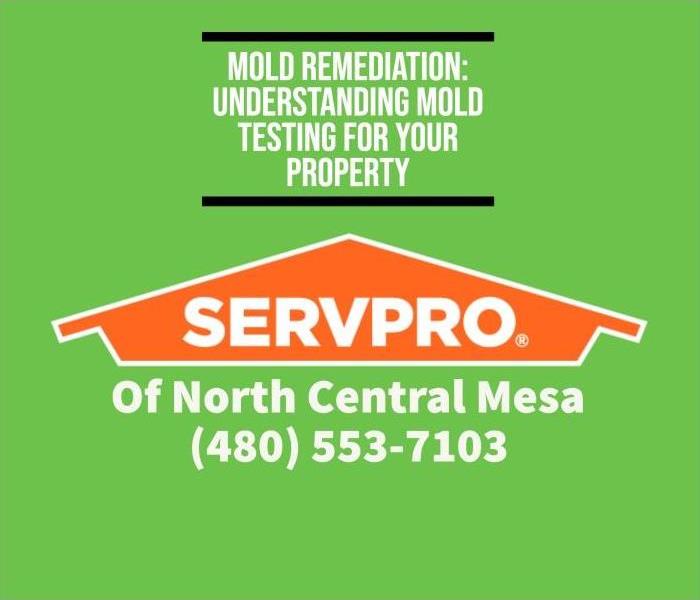Mold Remediation: Understanding Mold Testing for Your Property
4/5/2023 (Permalink)
Mold growth can have adverse effects on your property and your health, making mold remediation an essential service. SERVPRO of North Central Mesa is committed to providing homeowners and businesses with the information they need to understand mold testing and its benefits. This blog post covers the basics of mold testing, how it's done, and the benefits it can provide to ensure a safe and healthy environment. We will also provide a FAQ section to answer other common questions related to mold testing.
What is Mold Testing?
Mold testing is a process used to detect the presence of mold in a building or property. This procedure is often necessary when mold is suspected but not visible or when a building has experienced water damage. Mold testing helps to identify the type and extent of mold contamination, allowing for effective mold remediation strategies. Mold tests are performed by certified mold inspectors, ensuring accurate and reliable results.
How is Mold Testing Done?
Visual Inspection:
The first step in mold testing is a thorough visual inspection of the property. This inspection is done to identify any visible signs of mold growth, water damage, or moisture issues. The inspector will examine walls, ceilings, floors, crawlspaces, and ventilation systems for any signs of mold or conducive conditions.
Air Sampling:
Air sampling is a common method used to test for mold spores in the air. The inspector collects air samples from various locations within the property and sends them to a laboratory for analysis. This method helps determine the concentration of mold spores in the air and identify the specific types of mold present.
Surface Sampling:
Surface sampling involves collecting samples from surfaces suspected of harboring mold growth. This can be done using swabs, tape lifts, or bulk samples. These samples are then sent to a lab for microscopic analysis to confirm the presence of mold and identify the species.
Moisture and Humidity Measurements:
High humidity levels and moisture are key factors contributing to mold growth. During mold testing, inspectors measure the moisture content of materials and the relative humidity levels in the property. This information helps identify areas at risk for mold growth and guides the remediation process.
The Benefits of Mold Testing
Health and Safety:
Mold can cause a variety of health issues, especially for individuals with allergies, asthma, or weakened immune systems. Mold testing helps to identify and address mold issues early, reducing the risk of health problems and ensuring a safe environment for occupants.
Accurate Remediation:
Mold testing allows for targeted and efficient mold remediation. By identifying the specific types and locations of mold, remediation efforts can be focused on the areas that need it most. This ensures thorough and effective mold removal, preventing recurrence.
Prevent Property Damage:
Unchecked mold growth can cause significant property damage, weakening the structural integrity of your home or business. Mold testing helps to identify and address mold issues before they become severe, saving you time and money on repairs.
Maintain Property Value:
Mold issues can negatively impact the value of a property. By conducting mold testing and addressing any issues, you can maintain or even increase your property's value, making it more attractive to potential buyers.
FAQs
Q: How much does mold testing cost?
A: The cost of mold testing varies depending on the size of the property and the complexity of the testing required. Contact SERVPRO of North Central Mesa for a detailed estimate based on your specific needs.
Q: How long does mold testing take?
A: The duration of mold testing can vary, but most inspections and sampling can be completed within a few hours. However, laboratory analysis of the samples may take several days, after which you will receive a detailed report on the findings.
Q: Can I perform mold testing myself?
A: While DIY mold testing kits are available, it is highly recommended that you hire a certified mold inspector to conduct the testing. Professional inspectors have the necessary knowledge, experience, and equipment to accurately assess mold issues, ensuring the most effective remediation plan.
Q: When should I consider mold testing?
A: Mold testing should be considered if you suspect mold growth but cannot visibly locate it, if your property has experienced water damage, or if you notice a musty odor. Additionally, mold testing can be beneficial during real estate transactions or as part of routine property maintenance.
Q: How can I prevent mold growth?
A: Preventing mold growth involves controlling moisture levels and maintaining proper ventilation. Regularly inspect your property for leaks, promptly repair any water damage, use dehumidifiers in high-humidity areas, and ensure your HVAC system is functioning efficiently.
Mold testing is a critical component of mold remediation, providing valuable information about the type and extent of mold contamination in your property. SERVPRO of North Central Mesa is here to help you navigate the mold testing process, ensuring a safe and healthy environment for you and your family. If you suspect mold issues in your home or business, don't hesitate to contact our team of professionals to schedule a mold inspection and discuss your specific needs.






 24/7 Emergency Service
24/7 Emergency Service
